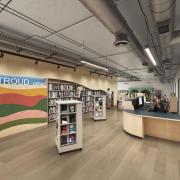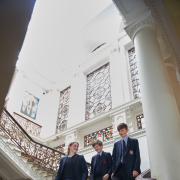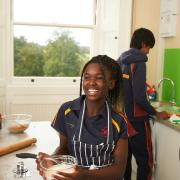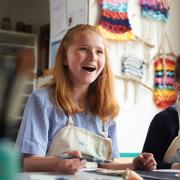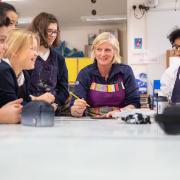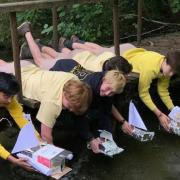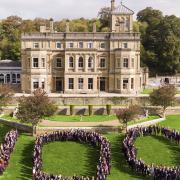Want to succeed? You need more than education says innovator and entrepreneur Sir David McMurtry. You need hands-on practical experience and sheer determination.
Aim for the sky
Want to succeed? You need more than education says innovator and entrepreneur Sir David McMurtry. You need hands-on practical experience and sheer determination.
As a teenager Sir David McMurtry had one dream - to work with aeroplanes. But his parents had other ideas. They wanted him to go into the insurance industry.
But his heart was with aeroplanes. He applied to Rolls-Royce but they turned him down. The companies didn’t recognise his Irish school qualifications.
He didn’t give up. He applied to Bristol Aero Engines Ltd and was accepted as a craft grade apprentice - a shop floor apprenticeship. It meant he spent one day at college and four on the shop floor. Do well, he was told, and the company would make him a full-time student.
“At school the only thing I was good at was maths and physics. I was a disaster at everything else,” he explains. “You could say I wasn’t a star pupil. My passion was aero-modelling. All I wanted to do was work on airplanes.”
That was in 1958. In 2012 Renishaw, the Gloucestershire-based company founded by David McMurtry - now Sir David - and John Deer - received its 15th Queen’s Award for Enterprise. Sir David was appointed a Knight Bachelor in 2001 for “services to Design and Innovation”.
Renishaw is a global company renowned for its skills in measurement, motion control, spectroscopy and precision machining. It has more than 60 offices in 32 countries with 95% of its sales outside the UK.
Sir David says that the grounding he received as an apprentice has stood him in good stead. On the shop floor he gained a wealth of practical experience in all sections, from machine tool millers to turners and grinders to finally engine building.
“I was fortunate. The reason I did well was that the craft-grade apprentices were two years younger as I left school at 18. Therefore it wasn’t difficult for me to shine academically. In maths and physics I was miles ahead because of the extra 2 years at school.”
The company, which subsequently became Rolls Royce (1971) Ltd appointed Sir David as a design apprentice. “I found myself in the design office with many talented people and quickly had to learn to swim.”
Swim he did, working his way up through the company to Assistant Chief of Engine Design. At the time of working on the Tornado engine, Sir David was asked to look at a measurement problem that Rolls-Royce had with fuel pipes on its Olympus engines for the supersonic Concorde.
Over a weekend Sir David invented the first touch-trigger probe to solve the problem. “I was told they ‘couldn’t make it because they couldn’t measure it’. So I went home to my garage and made the first one myself. I thought it was a one-off solution.”
But when the measuring machine manufacturer saw the probe he asked where he could buy it and then ordered 12 from Sir David. Along with fellow Rolls-Royce colleague John Deer - now Deputy Chairman of Renishaw - they decided to set up in business.
“I told John that I would do the design if he could get someone to make them and sell them. John assembled everything in one of his bedrooms - that was our first factory - and I had my machine shop at home in Wotton-under-Edge.”
When Sir David realised the probe had commercial value he set about getting a patent. It had to be registered through Rolls Royce. Once done Rolls Royce had to issue a license allowing Sir David to make it but they would only issue a licence to a limited company and not an individual.
It took six months to register a company but Sir David and John Deer wanted to do it quickly. A company in Bristol registered companies and sold them on, so the pair bought one - called Renishaw Electrical Ltd - for �45. They planned to change the name but never got around to it and so Renishaw stayed.
The two men took out no borrowings to start the company. They simply started small and continued to develop and grow. In 1979, Sir David left Rolls-Royce to work full-time to develop Renishaw.
Looking back Sir David maintains that practical experience on the shop floor was what helped set him apart. “My strength was practical experiences combined with the theory. That practical side made me different.”
This understanding of the value of practical training led to Renishaw starting its own apprenticeship scheme in 1979 and in 1984 also started a programme to sponsor students before they go to university. “That way they come here and get true practical experience and then we mentor them through the system.”
It has worked well. At the moment there are four divisions of Renishaw headed by people who came through the Renishaw programme.
Renishaw does far more than just work in the aero industry. Its work involves laser interferometry for machine performance evaluation, systems to produce dental crowns and bridges, Raman spectrometers and robots for neurosurgical applications.
The company’s strength is its commitment to research and development with historically around 18% of its annual sales invested in R&D and development. Sir David’s passion is innovation and he is adamant that UK universities need to do more to protect its research.
“There is a lack of practical commercial knowledge within universities. There is this pressure to do the research and publish, but there is a lack of practical experience in creating strong patents that can be defended, and the research tends to go everywhere.
“The best thing to do is for universities to educate students and allow them to do their research in a protected environment, such as a company, where the work can lead to exportable products.”
The biggest challenge, says Sir David, is getting young people interested in engineering. “You’ve got to get young people interested in engineering. They don’t really know what it is.”
He is concerned, as is the rest of the industry, that Design and Technology, will be removed from the National Curriculum. The Government has agreed to remain compulsory at key stages 1 and 2 but no decision has been made for the National Curriculum in secondary schools.
“Engineering is about being interested in making things. It is practical. It’s about making something and then learning by what has worked and what hasn’t worked. There are not enough people out there doing good engineering. Having it in the National Curriculum is key to create enough engineers for the future.”
Facts you didn’t know about Sir David McMurtry
He attended Mount Joy School, now called Mount Temple, and the school that most of the rock band U2 attended.
As a teenager he bought a BSA125 motorcycle and rebuilt it himself
In 2011 he was elected a fellow of the Royal Society, the UK’s national academy of science. His citation noted that he “is distinguished for his ability to think laterally and come up with innovative solutions to measurement problems, combined with business leadership”
His qualifications are:
Certificate of Training from Bristol Siddeley Engines Ltd
Diploma in Mechanical Engineering from The Bristol Aeroplane Co Ltd Technical College
Higher National Diploma in Mechanical Engineering





